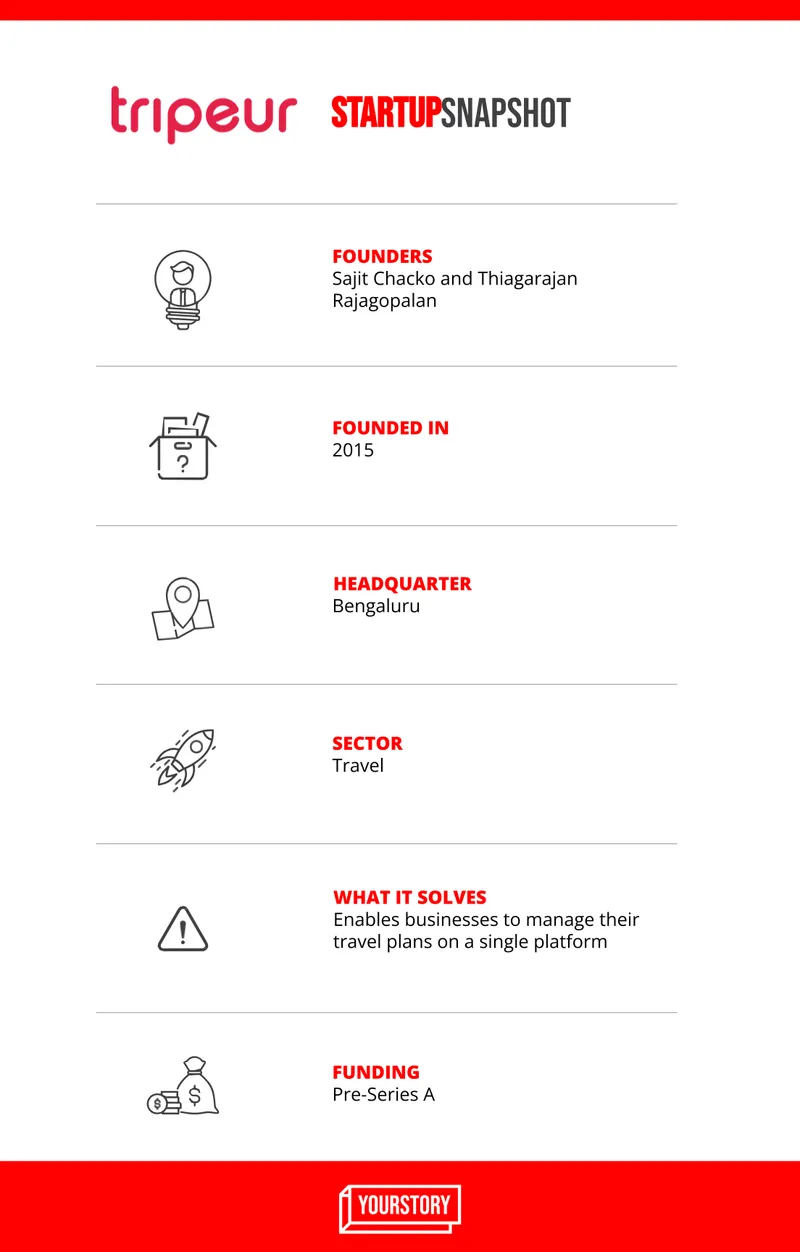This Bengaluru startup enables businesses to manage their corporate travel plans on a single platform
Corporate travel startup Tripeur integrates with adjoining HR and expense systems of corporates to offer products like trip creation, approval, tickets for all services, policy adherence, behaviour shaping, analytics for savings and compliance.
According to the World Travel and Tourism Council (WTTC), India, the seventh-largest business travel market globally, is projected to be among the top five travel markets by 2022. While 60 percent of the business travel market is managed by small travel agents, only 20 percent is managed by legacy travel management companies.
“Both of them are old fashioned, operationally heavy, and bereft of any technology offerings for their customers,” says Sajit Chacko, Co-founder of Tripeur — a Bengaluru-headquartered cloud-based, fully-integrated business travel startup.

He adds, “Customers are looking for efficiency, insights, and are going digital. This new opportunity is set to disrupt the legacy play in corporate travel.”
Founded in December 2015 by Sajit and Thiagarajan Rajagopalan, the travel-tech startup integrates with adjoining HR and expense systems of corporates to offer products like trip creation, approval, tickets for all services, policy adherence, behaviour shaping, analytics for savings and compliance.
The startup’s smart travel ERP transforms the manual corporate travel function to a unified platform experience for travellers, managers, admins, and CFOs, guaranteeing transparency, control, and insights.
How it works
provides a solution that configures, manages, and controls travel budget in real-time at a cost centre level.
“It is the only platform that allows all your offline travel vendors (cab vendors, etc.,) to be attached to the online platform for centralised invoice management and approved trip level reconciliation,” he says.
Tripeur’s average approval time is under five minutes due to its WhatsApp integration. About 95 percent of the transactions happen instantly on its system with immediate invoices and credit notes. The remaining five percent are from train/tatkal/VISA, etc., which carry a fixed TAT.
“We enjoy a "zero" reconciliation issue in over two million transactions done till now,” Sajit shares.
Tripeur provides information from all popular sources — air, hotel, bus, train, cabs, and insurance — and claims to provide users with the best available rates and content. It also integrates with third-party vendors to create a seamless multi-vendor experience platform.
“About 30 percent of our customers have come via referral from our existing customers. We have integrations with WhatsApp, Google, Microsoft, DarwinBox, PeopleStrong, and Zoho, as well as Open APIs, to connect with other HR/Expense/Finance systems,” says Sajit.
The USP
With Tripeur, users can plan, monitor, control, and optimise their travel functions on a single platform, coupled with the service goodness of legacy travel companies, Sajit says.
“Technology that you currently do not have, now, is integrated and helps you manage your travel costs without investing in a heavy team,” he adds.
As per Sajit, Tripeur is meant for those organisations who want to enjoy the benefits of great service, but are lacking a unified platform for controls.
Globally, it competes with the likes of TripActions, Travelperk, and domestically, it faces competition from Itilite.

The team
After completing his hotel management course from IHM, Sajit worked with the Leela Group for eight years. He decided to join the entrepreneurial bandwagon in 2005 after his one year stint with Sequoia-funded startup 247 Inc.
From 2005 to 2014, Sajit dabbled with many gigs, restaurateurs, grain trade, newspaper digitisation, etc.
“My success with restaurants gave me the confidence to pursue being an entrepreneur… Through references and connections, I met Thia (Thiagarajan Rajagopalan). We spent about eight months together discovering the opportunity, conceptualising, and validating, before we registered our firm in December 2015,” he adds.
At present, Tripeur has 15 members in its team. Launched with a corpus of Rs 20 lakh, the startup used the funds to make market visits, get licenses for content, and use a third-party vendor to build a basic platform.
Funding and monetisation
To date, Tripeur has raised about $2 million from SenseAI, Pentathlon, Incubate Fund, family offices of Hero and Patni, and others.
“We are looking to raise another $2-3 million,” says Sajit, adding, “COVID-19 has muted our growth temporarily. We were growing at 40 percent Month-on-Month pre-COVID and recovery has been about 60 percent with zero churn. We are planning for a 10X growth by the end of 2023.”
The startup charges customers per transaction for the usage of the platform and services and also gets a commission from its service partners.
The way ahead
Tripeur is targeting companies with travel spend of Rs 1 lakh to Rs 2 crore per month, with an employee base of over 25. The startup aims to venture into the South East Asia market, starting with Indonesia.
Present pan-India, Tripeur has a customer base of over 50 companies, including Siemens, Udaan, DTDC, Livspace, Meesho, Sharechat, etc., with over one lakh users having done over 100 lakh transactions.
“Our content partners are Travelport, Indigo, Spice Jet, GoFirst, TBO Tek, Make My Trip, Yatra, OYO, Treebo, Bajaj Insurance, IRCTC, RedBus, etc.,” Sajit says.
He adds, “We have planned a three-pronged approach to scale: marketing and aggressive lead generation for the funnel, inside sales to optimise the sales cycle, and self helped onboarding for small companies.”
Edited by Suman Singh



![[Startup Bharat] How this textile commerce startup is disrupting the traditional supply chain of the industry](https://images.yourstory.com/cs/2/b87effd06a6611e9ad333f8a4777438f/fabriclore2-1642050246326.png?fm=png&auto=format&h=100&w=100&crop=entropy&fit=crop)




